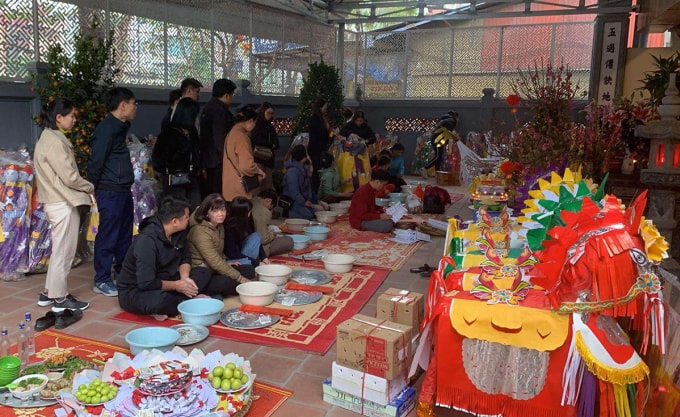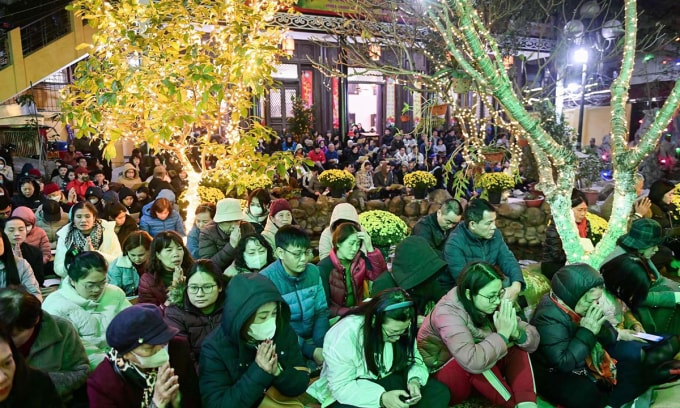At 2 a.m., after the nearly 6-hour long "star offering ceremony" ended, her legs were numb and numb, but Ms. Hong Nhung still breathed a sigh of relief, feeling that her bad luck was gradually disappearing.

For more than ten days since Tet, a 54-year-old woman in Vinh City, Nghe An has been restless. This year, she is "being affected by the bad star La Hau" which could affect her health, work and fortune, and she needs to get rid of the bad luck as soon as possible.
To have a ritual to dispel bad luck at a large temple in Nghe An, Ms. Nhung had to register a month in advance and, along with 40-50 other families, hire a shaman and pay for offerings and votive paper.
The ceremony lasts from 8pm the night before to 2-3am the next morning, with rituals such as coin cutting, paper boat launching, and paper cutting in four colours symbolising the four seasons. At the end of the ceremony, hundreds of people pray together and release fish and eels into the river to ward off bad luck.
"This is a special ritual for those affected by bad stars like Ke Do, Thai Bach, and La Hau," said Ms. Nhung.
Before Tet, Mr. Hoang Anh was warned by his mother and wife that "next year is very bad, with the star Ke Do, Tam Tai and Thai Tue", he may have an accident, illness or funeral.
"I don't care about superstitions," he told his wife.
But on the first day of Tet, Hoang Anh fell off his motorbike and broke his phone. His family confirmed that this was the result of bad luck in his year of birth, making him worried and deciding to find a place to ward off bad luck and pray for good luck.
In addition to the general procedures, Hoang Anh spent a few million more dong to buy paper horses and effigies, hoping that the gods would "carry" bad luck away and help him shoulder the bad luck.
"I even held a ceremony and bought a talisman to ward off bad luck for my car, hoping for a safe trip all year long," the 42-year-old man said.
According to Associate Professor, Dr. Pham Ngoc Trung, former Head of the Department of Culture and Development (Academy of Journalism and Communication), the practice of "offering stars to ward off bad luck" began to become popular in the late 1990s, when economic life became more prosperous.
Experts explain that in Eastern philosophy, each person has a star that governs their destiny, depending on the year of birth, with 24 stars divided into 9 constellations including Rahu, Saturn, Mercury, Venus, Sun, Yunhan, Ketu, Moon, and Jupiter. These nine stars have good stars and bad stars.
The ancients believed that when bad stars shine on people, they will encounter bad luck such as accidents, illnesses, and pain. Stars like Rahu (for men) and Ketu (for women) are considered "dark stars", causing serious effects because they cannot see the sun. Folklore has a custom of offering stars to dispel bad stars and attract energy from good stars.
In the past, people went to temples and shrines to pray for good luck with simple procedures, mainly to comfort their spirits and ease their worries. Nowadays, some spiritual practitioners deliberately exaggerate the influence of stars on fate, causing people to be afraid and flock to perform ceremonies and worship.
According to Mr. Trung’s survey over many years, from the 8th to the end of January, in addition to temples, some pagodas in Hanoi also attract people to come to pray for good luck with prices ranging from several hundred thousand to millions of dong per person. The scale of each night of the ceremony can reach hundreds, even thousands of people.
"Offering prayers to ward off bad luck only serves as spiritual comfort, cannot completely erase bad things and only brings good luck," the expert emphasized.
According to Mr. Trung, going to the temple at the beginning of the year to pray for good luck and ward off bad things shows belief in sacred things, but it needs to be practiced correctly.
Sharing the same view, Dr. Nguyen Duc Hien, Director of the Center for Research on Vietnamese Traditional Culture Education, said that in Buddhist teachings, there is no concept of bad stars, good stars, or offering to the stars to ward off bad luck. Each person's destiny is not determined by the stars, but by karma, which is formed from "body, mouth, mind" - that is, words and actions. The good and bad things that each person receives are the result of the law of cause and effect. Acting right and doing many good deeds will bring blessings, on the contrary, doing bad deeds will bring retribution.
However, recently, many people have taken advantage of spirituality for personal gain, spreading superstition, creating lavish and wasteful rituals, distorting the original meaning.

"Some people even consider spending money to ward off bad luck like buying spiritual insurance to avoid bad luck," Mr. Hien said. "This is like making offerings to 'bargain' with the gods, praying for this or that."
To "buy" peace of mind for the new year, Van Trang in Nam Tu Liem district, Hanoi spent tens of millions of dong to open a star offering ceremony to ward off bad luck at home.
As a businesswoman, this year she encountered the Thai Bach star, the 34-year-old woman was worried about losing money and getting into trouble with the law. Since the 6th day of Tet, she invited a monk from Ha Tinh to Hanoi to set up an altar.
"I hope the bigger the ceremony, the more sincere I show, hoping that the gods will bless my work and life to be better," she shared.
Associate Professor, Dr. Pham Ngoc Trung believes that if a big ceremony could resolve bad luck, traffic accidents, divorce, domestic violence, robbery, natural disasters and other risks would not have occurred.
According to him, each person creates his own "karma" from his actions, not from good or bad stars. One should also not believe that after completing the ritual to dispel bad luck, bad things will not happen and expect miracles from "above" to solve all problems.
"The natural law of human life is that there are ups and downs. Offering prayers to the stars to ward off bad luck cannot dispel bad stars and prevent all misfortunes," Mr. Trung affirmed.
According to Mr. Hien, instead of focusing on performing star offering ceremonies to ward off bad luck or worrying about being caught in bad stars, people should proactively "bounce back bad luck" for themselves, such as: being careful with words, keeping a pure mind, helping the poor and not doing illegal work to live peacefully, away from the law.
"What you sow is what you reap. Success or failure is created by our mind, speech and intention. Bad karma will bring bad results, while good karma will bring good results," Mr. Hien shared.
VN (according to VnExpress)